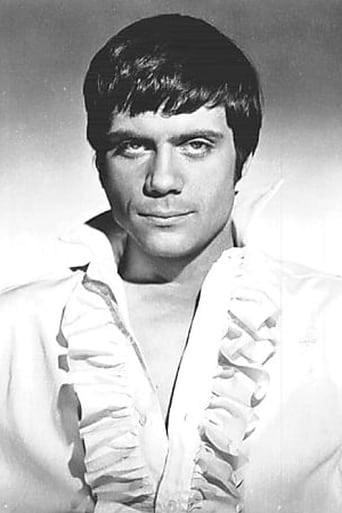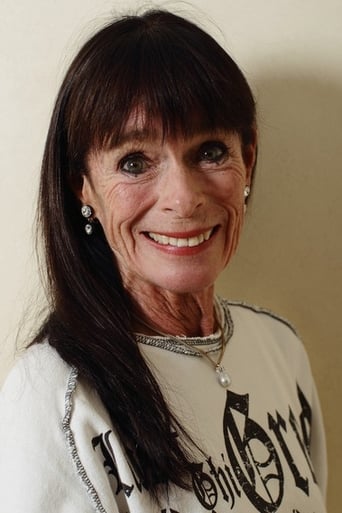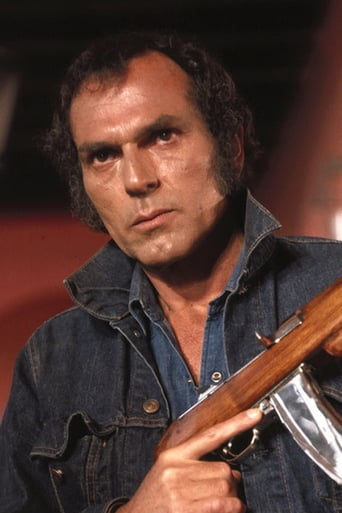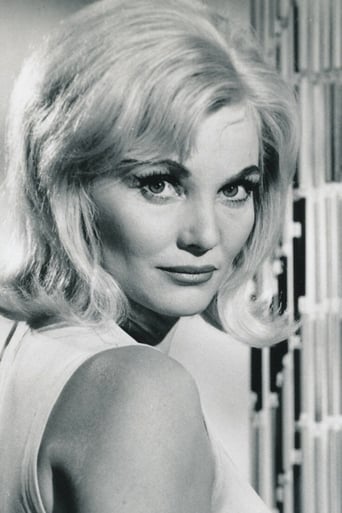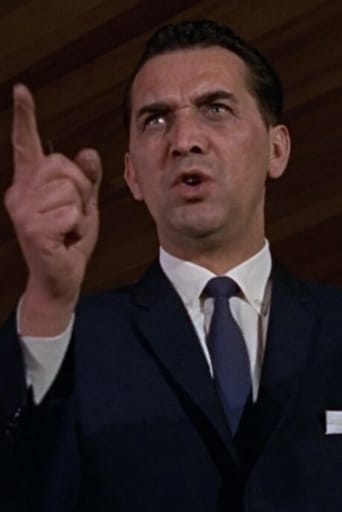BootDigest
Such a frustrating disappointment
Sarentrol
Masterful Cinema
Fatma Suarez
The movie's neither hopeful in contrived ways, nor hopeless in different contrived ways. Somehow it manages to be wonderful
Zlatica
One of the worst ways to make a cult movie is to set out to make a cult movie.
Coventry
Films with a premise like "Z.P.G." are the most disturbing ones imaginable. This is the sort of science fiction concept that one day could actually become reality! Probably is a much less drastic format and fascist execution, but nevertheless the rudimentary principle of law-obtruded birth control is alarmingly plausible. In the distant future, when people standard have to wear oxygen masks to walk over the streets and visits museums to see what a 20th century domestic family diner looked like, the government suddenly decides that no couple is allowed anymore to produce any children for the next thirty years. This incentive is launched to put a stop to the destroying of the earth by overpopulation. The last legally born children are branded with a laser and all aspiring families are welcome to apply for a fully personalized child dummy. With removal from society as the harsh punishment for illegal pregnancy, the birth rate immediately drops back to Z(ero) P(opulation) G(rowth). However, museum actress Carol McNeil's biggest wish is to bear and raise a child. When she pursuits her will, her husband Russ – the almighty Oliver Reed – is forced to entrench his belly-developing wife in a hideout shelter and think up excuses for her continuous absence on the surface. But a severe crime like this can't be kept secret forever… "Z.P.G." is a tremendously astonishing film. It's often compared with "Logan's Run" and "Soylent Green" but this movie predates the both of them and it's immensely underrated whereas the others are more likely overrated. This is the type of absorbing Sci-Fi that gradually becomes more disturbing if you contemplate about it too much. The surveillance over the population is harrowing (for example: when you show interest in reading articles about parenthood in the library, you're promptly put in isolation for questioning) and the overall depiction of our future society is just downright depressing. People are stiff, emotionless and robot-like beings and unconditional friendship or even interaction between families doesn't seem to exist anymore. The purely fictional elements of the plot vary from pretty damn scary (the mechanical replacement kids) to silly & clichéd (live newscast reporting from a gigantic zeppelin floating over the Metropolis) but they always remain compelling. The most fantastic trump of "Z.P.G." is that the plot never stops evolving. Once the baby is born, other and even more challenging issues arise, like rivalry and all-overpowering sentiments of mother instinct. This movie is an incredibly absorbing Sci-Fi magnum opus that had my mate and I glued to the screen from start to finish. The atmosphere and despair and paranoia is so real you can almost taste it, the decors and set pieces (albeit occasionally cheap looking) are imaginative and the screenplay is so intelligently written that it covers every tiniest potential plot hole or possible default. Oliver Reed once more demonstrates what an incredibly versatile actor he was. His stern and masculine appearance truly adapts to all sorts of roles; even to a melodramatic one. "Z.P.G." was made at the peak of Reed's career, as he starred in numerous classic horror/cult movies around that time, like "The Devils", "Revolver", "The Hunting Party" and "Blue Blood".
jcplanells3
This film was exhibit in the Sitges Fantastic Festival 1972. Geraldine Chaplin was awarded as Best Actress for her play. The commentaries published in SF magazines of their time were enthusiastic. Unfortunately, the film was almost non-exhibit in Barcelona (one week in one theater of double program, and in 1974 in Madrid in the same conditions). Now, there is a DVD edition in Spain, but only in dubbed, not with original voices. This is a film very representative of its time, early '70. The same year when this movie was presented, another SF films ere "Solaris", "A Clockword orange" and "Silent Running": another kind of fantastic or SF films, very different of the SF and fantastic films of today (or even 10 years later...). It is curious to note that some guides and encyclopedias of fantastic films are not favorable to this film, and eve one of them indicates that the movie ends without no sense. At least, the DVD edition shows clearly that the couple arrives to an inland that is a radioactive cemetery, a bitter end for their history. Could be that some versions of the film omitted this end? Certainly, it is not a enjoying movie: it is very sad, very dark. The best scene is, perhaps, when Carole (Geraldine Chaplin) is going to have a baby in the cellar: a very good scene. Z.P.G. is a rarity of its time. It is also another conception of SF movies, now forgotten and missing.
Deusvolt
In the not too distant future, overpopulation with its resultant pollution has made most of the earth unfit for habitation. A portion of humanity has retreated into a hermetically sealed city. By edict couples are prohibited from having children. Exempt are those born Before Edict and the initials B.E. are invisibly engraved on those children's foreheads visible only under a special light wielded by law enforcers.Deprivation of maternity has driven many women to psychosis. There is a scene where women scream at another woman with a young child "Baby! Baby!" and the authorities move in. It turns out that the child has a B.E on his forehead.Despite the danger, the characters played by Reed and Geraldine Chaplin decide to have a baby anyway. Gripping was the scene when Reed was researching via a virtual library on how to perform a baby delivery. He was of course being monitored by a "Big Sister" computer of the authorities. How he got to the sections about maternity and delivery is interesting. He first surfed through sections about some obscure aspect of monastic art,Premonstratensian art. From there he managed to navigate to pregnancy and delivery. The computer, however, sensed that he drifted into the taboo topic of childbirth. Reed's chair clamped onto him sending volts of electricity into his body. He pretended to be disgusted at the videos he saw of childbirth and alleged that he was about to report and protest the presence of such "filth" in the library. His acting here was notable as he seemed to be really in pain with his face oily and perspiring. The leader of the civilization rides in some kind of whimsical toy-like flying saucer that plays "Pop Goes the Weasel" every time he makes an appearance. The tone, texture and general treatment of this film is both amusing and unsettling at the same time. It is what makes it a fine one.The horrors governments would be willing to perpetrate to achieve Zero Population Growth was accurately predicted in this movie. Compulsory mass abortion was (is?) practiced in China in the '80s. There too was the testimony of a Chinese lady doctor who escaped to the West that babies who were delivered live illegally (more than two children for the couple) were murdered by injecting poisons into the fontanel. Later China amended the two-child decree to only one. During Indira Gandhi's regime in India, Rajiv (her son who later on became PM himself), regularly went on patrol gathering young men and having them forcibly sterilized. And of course, women who went to public health clinics for any reason were summarily sterilized once it was determined that they already had children. But why pick on China and India, abortion in the U.S. and in most of the EU is also done on a massive scale under the alleged "right to privacy" and of "freedom of choice."If you are intrigued by societies that seal themselves off from the rest of the world and humanity, check out Zardoz (1974 with Sean Connery) and Logan's Run (1976 with Michael York). There is also, of course, The Time Machine of which I know of at least two film versions. I like the older George Pal production because of its lush texture and the beautiful actors (Yvette Mimieux and Rod Taylor). The Lost Horizon also has two versions one made in 1937 and the other in 1973. The newer version is the better one with Peter Finch and Liv Ullman although the parts with George Kennedy (singing at that) and Sally Kellerman made it somewhat corny.
ystava78
When I bought this film from a secondhand videoshop I was amazed by the quality of this movie. The use of cameras, music and plot were wery artistic. Twisted utopia genre is allways interesting (like Zardoz), and this movie is no exeption. This movie is a must see 70's scifi gem.

